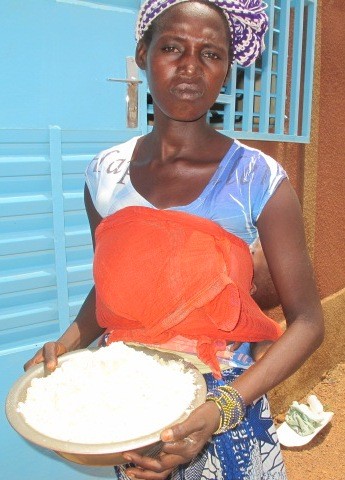
March 2015—In Burkina Faso, many populations are still recovering from the 2012 food and nutrition crisis that left hundreds of thousands food insecure. In fact, one out of every three children under 5 is stunted in Burkina Faso, increasing the likelihood of irreversible cognitive impairment and poor health.
Awa Sawadogo and her fourth child used to be a part of that vulnerable population, suffering from acute malnutrition and not knowing where their next meal would come from.
In 2013, USAID's Office of Food for Peace, the U.N. World Food Program, the Government of Burkina Faso and local health clinics started a 21-month project that has helped provide nutritional assistance to children under 5 and pregnant and lactating women who suffer from malnutrition. To identify cases of malnutrition, women and children, including Sawadogo, attended consultations with health workers in which they were screened for symptoms.
Every two weeks, pregnant and nursing women who were found to be malnourished benefited from a ration of Supercereal, a corn-soy blend enriched with micronutrients, to supplement their current diet. As a result, mothers and children like Sawadogo and her child have fully recovered from acute malnutrition and are at a healthy weight.
In addition to receiving food assistance, project beneficiaries were also educated about important health and nutrition topics to help them sustain their health in the longer term. Salimatou Ouedraogo underwent treatment when she was discovered to be malnourished while pregnant with her third child.
“I hope my baby will be born in good health [as a result of this treatment],” said Ouedraogo. After her treatment, she learned how to use Supercereal to make porridge that she can enrich with local ingredients.
The project also focuses on strengthening community resilience by providing conditional cash transfers across six regions in Burkina Faso where food insecurity is prevalent. In exchange for cash transfers, participants work to improve soil and water conservation and rehabilitate lowlands, which are necessary for rice production and market gardening. As Burkina Faso has well-established marketplaces with adequate food supplies, cash transfers enable vulnerable populations to locally purchase food—which they could not previously afford—with the supplementary income from the rehabilitation work.
In a country with more than 50 percent of households identified as food insecure, this project provided a lifeline to more than 6,000 pregnant and lactating women and children under 5 in fiscal year 2014. Community members are now able to continue their lives with better knowledge of essential health and nutrition practices, and are a step closer toward achieving longer-term food security for themselves and their families.
LINKS
Follow @USAIDWestAfrica, on Facebook, on YouTube







Comment
Make a general inquiry or suggest an improvement.